rujan 2011. - Hrvatsko sociološko društvo
rujan 2011. - Hrvatsko sociološko društvo
rujan 2011. - Hrvatsko sociološko društvo
You also want an ePaper? Increase the reach of your titles
YUMPU automatically turns print PDFs into web optimized ePapers that Google loves.
‣ Švarc, J., Lažnjak, J., Perković, J."Unintended consequences of the innovation policy programmes: social<br />
evaluation of the Technological Projects programme in Croatia". Innovation: Management, Policy &<br />
Practice. 13 (2011) , 1; 77-94<br />
www.innovation-enterprise.com/archives/vol/13/issue/1/<br />
Sažetak: The paper presents empirical results of social evaluation of the first innovation policy programme,<br />
Technology Projects (TEST), in Croatia to identify and explain the main bottlenecks of the programme and put them<br />
in perspective in terms of the entire innovation system. The motivation is the growing criticism of innovation<br />
system's efficiency and perception of poor return on public investment in innovation policy programmes. The<br />
proposed method of social evaluation is based on combination of the institutional theory and the sociological<br />
approach of intended and unintended consequences. It reveals that expected outcomes of the programme such as<br />
commercialisation of research and technological outputs are exchanged, in the majority of projects, for essentially<br />
scientific results such as scientific publications and extension of the on-going scientific projects. The reasons are<br />
found in the institutional deficits that point to the persistence of some common 'systemic' problems in the innovation<br />
system. Their drivers are identified in three types of institutional deficits: administrative rules and procedures, some<br />
aspects of social capital and broader socio-economic environment that commonly determine behaviour and<br />
interaction of the main stakeholders of the programme.<br />
‣ Traen, B., Štulhofer, A. (2011). "Self-assessed risk of HIV and other STIs among young adults in Norway<br />
and Croatia". Sexuality and Culture, DOI:10.1007/s12119-011-9098-x<br />
http://www.springerlink.com/content/0tq50u618737m186/<br />
Sažetak: The purpose of the present study is to explore how sexually active young Norwegian and Croatian adults<br />
assess the risk of being infected with HIV and other STIs. Study results are based on a 2009–2010 large-scale<br />
national probability survey of young adults aged 18–24 in Croatia (n = 1,005) and Norway (n = 871). A majority of<br />
sexually active young adults in Croatia and Norway assessed the risk of becoming infected with HIV or other STIs<br />
as low or negligible. Among non-condom users, 85–98% determined they had low or no risk of getting infected with<br />
HIV. The corresponding figures for STIs were 77–79%. In both countries a higher HIV risk self-assessment was<br />
observed among those who had had same-sex sexual experience, those who reported a higher number of sex partners<br />
during the past year, and those who were single. When investigating the patterns of HIV/STI risk assessment, gender<br />
and country-related differences appeared. Condom use associated with higher risk assessment was significant only<br />
among Croatian men. The strong perception of condom use as being a male responsibility in Croatia may be the<br />
reason for a higher risk assessment for unwanted pregnancy and HIV/STIs when protection fails. The risk<br />
assessment for HIV/STIs was not associated with partner turnover in Croatian men. New campaigns need to develop<br />
gender-sensitive messages, particularly targeting men who believe that a great number of sexual partners is a sign of<br />
manliness and women who shy away from their responsibility to use protection.<br />
‣ Topić, M. "Nations and Nationalism: Questioning Ernest Gellner’s Theory." Intersticios. Revista<br />
sociológica de pensamiento crítico. 5 (2011)<br />
http://www.intersticios.es/article/download/7261/5746<br />
Sažetak: The question of nations and nationalism always brings a lot of question for there does not seem to be an<br />
agreement on the roots of nationalism and the typology it brings with. The disagreement on nation and national goes<br />
that far that, there is no agreement on who used the term nationalism first and let alone on actual applicability and<br />
consequences it goes with. Ernest Gellner, as an author of one, largely discussed, theory, sees nations as bi-products<br />
of industrialization and as made up where they did not exist before. In this sense, he identifies three periods of<br />
human lives: hunter-gatherer (or, pre-agrarian), agro-literate and industrial and sees nationalism as an existing<br />
movement only in the third one. In this sense, he ties nationalism with imperialism for he claims that nationalism<br />
always seeks to spread the boarders and for the higher class to control the lower class. Also, he sees impossible for<br />
pre-industrial societies to be able to foster nation and nationalism as such since, for him, nations do not exist where<br />
there is no state. This paper therefore discusses this theory based on other theories of nationalism that offered<br />
different views (namely Benedict Anderson’s and Anthony D. Smith’s theories) as well as some examples of<br />
nationalistic movements from Spain and Croatia. The issues questioned in this paper are thus Gellner’s view of<br />
nationalism emerging after industrialization, non-existence of nationalism without the state ; the system of the state<br />
education as a means of enforcing nationalism and cultural and national homogeneity.



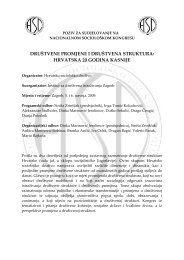

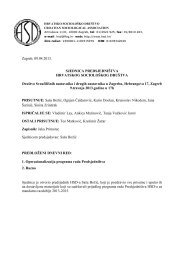
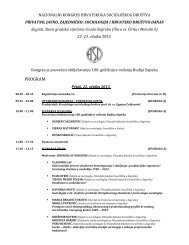
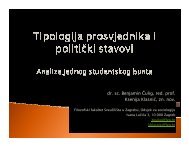
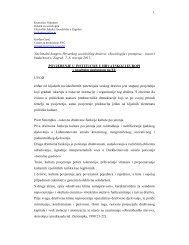
![PROGRAM SKUPA [pdf] - Hrvatsko sociološko društvo](https://img.yumpu.com/38770359/1/184x260/program-skupa-pdf-hrvatsko-socioloako-druatvo.jpg?quality=85)


